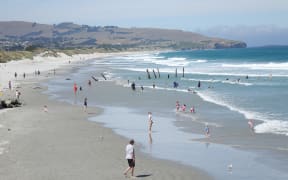New Zealand hasn't had a below average temperature since January last year, scientists say.

It's a hot start to 2018. Photo: 123RF
That equates to 14 months - a period of time Niwa meteorologist Ben Noll has labelled "pretty exceptional".
He said the temperatures could be attributed to an increase in northerly winds, which bring warm air from the tropics and sub-tropics.
New Zealand hasn't had a month where nationwide temperatures were below average since January 2017, or in 14 months! ️️️ pic.twitter.com/WZh7BeYj38
— NIWA Weather (@NiwaWeather) March 19, 2018
This air increased the temperature of New Zealand's seawater, which directly impacted the country's on-shore climate.
"As we rounded out 2017 and started 2018 we had a very striking climate feature, and that was the marine heatwave that developed in the Tasman sea and New Zealand's coastal waters," he said.
"If the seas are warmer than average, we are warmer than average."
The marine heatwave had also encouraged several extreme weather events, Mr Noll said.
"Certainly this year we've had some effects from our ex-tropical cyclones that were energised by the marine heatwave and that led to some damage in parts of the upper South Island," he said.
"These are kind of flow on or tertiary impacts from the warming that has occurred in recent times, that can kind of be attributed to the warmer climate we've seen overall in the last year plus."
According to Mr Noll, New Zealand's produce could be impacted if the hot weather continued.
"In the decades to come it could mean evolving patterns of where we grow our crops such as kiwifruit and avocados, some areas becoming more likely to see growth [such as] southern areas of New Zealand," he said.
"And then some areas becoming less favourable, that is further north in New Zealand because it's too hot for certain crops or certain plants."






